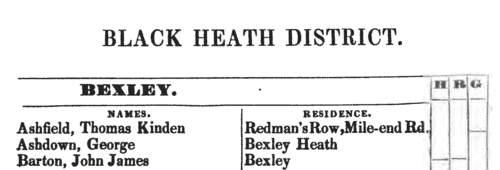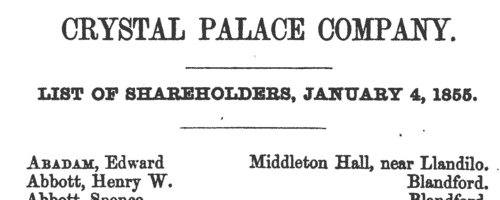Waude Surname Ancestry ResultsOur indexes 1000-1999 include entries for the spelling 'waude'. In the period you have requested, we have the following 15 records (displaying 11 to 15):
Buy all | |
| Get all 15 records to view, to save and print for £70.00 |
These sample scans are from the original record. You will get scans of the full pages or articles where the surname you searched for has been found.
Your web browser may prevent the sample windows from opening; in this case please change your browser settings to allow pop-up windows from this site.
Tradesmen of York
(1559-1759)
No man or woman could trade in the city of York without having obtained 'freedom' of the city. Their names were recorded on the 'Freemen's Roll', or Register of the Freemen of the City of York, which contains about 16,600 names for this period. A list of names was prepared for each year. Each annual list starts with the name of the mayor and the camerarii or chamberlains. The chamberlains were freemen charged with the duty of receiving the fees of the new freemen; of seeing that only freemen traded in the city; and of preparing this roll, which was compiled from the names on their own account books from the receipts for the fees. There are three groups of freemen: those who obtained freedom after serving out an apprenticeship to a freeman; the children of freemen (per patres); and a handful who claimed freedom by 'redemption', i. e. by purchase or gift from the Mayor and Court of Aldermen.
WAUDE. Cost: £2.00.  | Sample scan, click to enlarge

|
 Apprentices and clerks
(1803) Apprentices and clerks
(1803)
Apprenticeship indentures and clerks' articles were subject to a 6d or 12d per pound stamp duty: the registers of the payments usually give the master's trade, address, and occupation, and the apprentice's name, as well as details of the date and length of the apprenticeship. 3 January to 31 December 1803. IR 1/39WAUDE. Cost: £8.00.  | Sample scan, click to enlarge

|
Electors in Greenwich
(1835)
A poll to elect knights of the shire to represent the Western Division of the county of Kent in parliament was held in 1835, the candidates being Thomas Law Hodges (H), Thomas Rider (R) and sir William R. P. Geary (G). The poll started on January 19th; Rider withdrawing his name on that first day, the poll was closed prematurely, many electors not yet having voted. This poll book lists all the electors, whether they voted or not; the county franchise included not only male freeholders of 40s a year, but also £10 copyholders and long-leaseholders, and £50 short-leaseholders and tenants. For each elector the full name is given (surname first) and residence (often not the place for which qualified to vote). Votes are indicated by dashes in the right-hand columns. WAUDE. Cost: £4.00.  | Sample scan, click to enlarge

|
Crystal Palace Company Shareholders
(1856)
The management of the Crystal Palace, built for the Great Exhibition of 1851, was restructured by a Deed of Settlement in 1852, and then incorporated as the Crystal Palace Company by royal charter in January 1853. This alphabetical list of shareholders was published in January 1856.WAUDE. Cost: £4.00.  | Sample scan, click to enlarge

|
Long-stay Paupers in Workhouses: York
(1861)
This comprehensive return by the Poor Law Board for England and Wales in July 1861 revealed that of the 67,800 paupers aged 16 or over, exclusive of vagrants, then in the Board's workhouses, 14,216 (6,569 men, 7,647 women) had been inmates for a continuous period of five years and upwards. The return lists all these long-stay inmates from each of the 626 workhouses that had been existence for five years and more, giving full name; the amount of time that each had been in the workhouse (years and months); the reason assigned why the pauper in each case was unable to sustain himself or herself; and whether or not the pauper had been brought up in a district or workhouse school (very few had). The commonest reasons given for this long stay in the workhouse were: old age and infirm (3,331); infirm (2,565); idiot (1,565); weak mind (1,026); imbecile (997); and illness (493). WAUDE. Cost: £6.00.  | Sample scan, click to enlarge

|
 | 1 | 2 |
Research your ancestry, family history, genealogy and one-name study by direct access to original records and archives indexed by surname.








